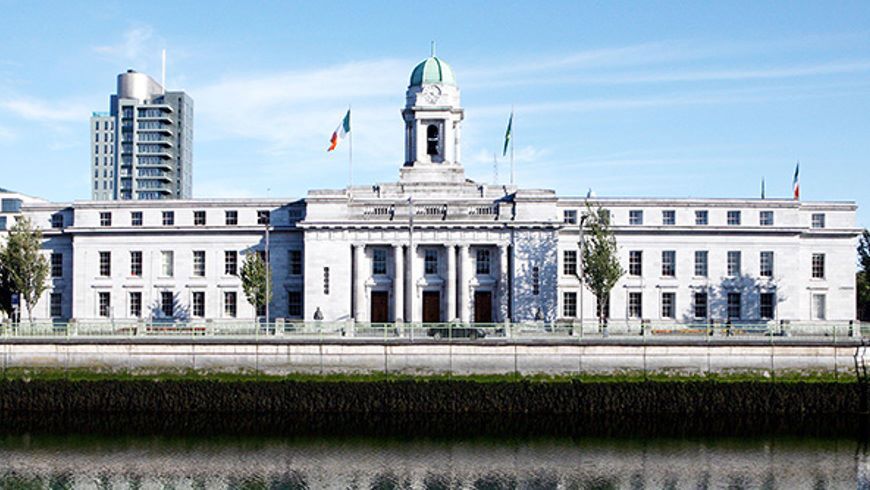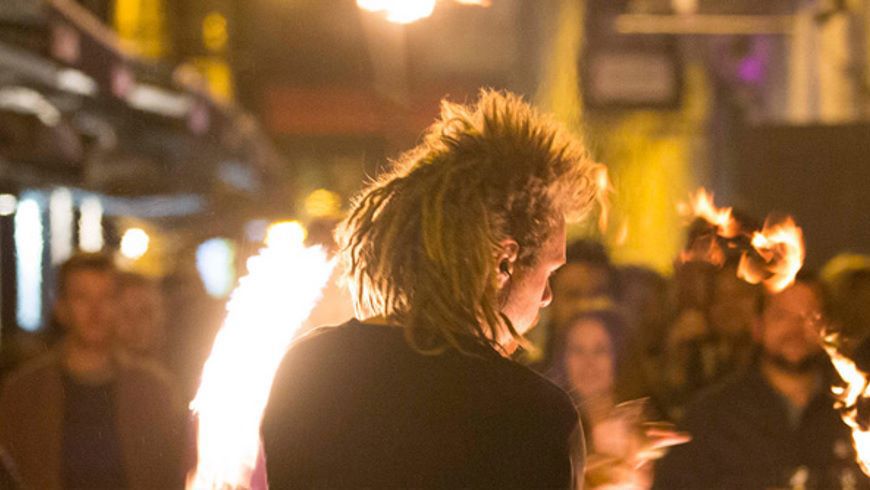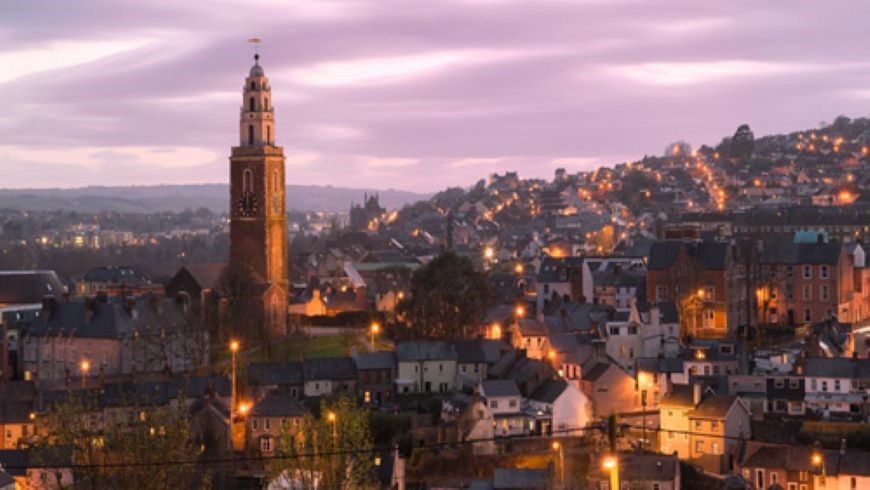Women's Caucus
Cork City Council's Women's Caucus 2024-2029
Councillor Ciara O'Connor, Councillor Michelle Gould, Councillor Fiona Kerins, Councillor Mary Rose Desmond, Councillor Niamh O'Connor and Deputy Lord Mayor, Councillor Margaret McDonnell
What is the Women’s Caucus?
The Women's Caucus is a cross-party initiative formed to increase female engagement and representation in local politics. It brings together Female Councillors from different political backgrounds to work collaboratively on addressing gender imbalances in political representation.
Upcoming projects:
Alma Mater - School Visits:
Plans are underway for the councillors to return to their former secondary schools to meet with female students, share insights about life in local politics, and encourage young women to consider careers in political leadership.
Period dignity Project – plans to expand project
There are plans to expand the project, making period products available at two additional locations before the end of 2025, further extending its reach and impact.
International Women’s Day
International Women’s Day will serve as a platform to bring together women from diverse backgrounds and cultures to celebrate women, raise awareness of their voting rights, and provide education on how to actively participate in local government and civic life.
Empowering Women in Politics: Cork City and County Council Women's Caucus Engage in Social Media and Productivity Training

Members of the Cork City Council and Cork County Council Women's Caucus’ gathered in the Council Chambers at Cork City Hall for a dynamic training sessions on 'Social Media CEO and Productivity in Political and Real Life.' The workshops were delivered by Women for Election and supported by the Department of Housing, Local Government and Heritage.
Cork City Council partner with Women for Election to deliver a dynamic new programme aiming to increase female participation in politics
13/02/2023
Women's Caucus .png (size 401.3 KB)
Cork City Council is announcing a partnership with Women for Election, kindly supported by the Department of Housing, Local Government and Heritage, to help deliver a free bespoke training and awareness programme aimed at increasing the number of women running for election in Cork City in 2024 and beyond.
The ‘More Women for Election in Cork’ programme will run from late February to June this year with three tailored training events taking place in the historic Council Chamber in Cork City Hall. The events will aim to engage, encourage and inspire women in all their diversity from across the county to consider getting involved in politics.
The upcoming events include:
- ‘Introduction to Politics’ with Pat Montague, an advocacy and strategy consultant working in the not-for-profit sector;
- ‘Women Belong’ with Yemi Adenuga, the first black woman to be elected as a local councillor. It will explore the importance of diversity and representation at the decision-making table
- ‘Power and Perseverance’ with Linda Kelly, National Secretary of Fórsa Trade Union.
Lord Mayor Cllr Deirdre Forde welcomed the announcement, saying: “This is a really encouraging and timely development as we begin to prepare for the 2024 local elections. I really hope that next year, we will reach equal 50/50 representation in our historic council chamber. I am one of only 6 women to act as Cork City’s first citizen, this startling statistic highlights the imperative to prioritise gender equality and diversity at local government level. I would encourage the women of Cork to sign up for this fantastic opportunity”.
Cllr. Mary Rose Desmond, Chair of Cork City Council’s Women’s Caucus said: “Cork City Council’s Women’s Caucus have been working to carve out a pathway to ensure more women are represented in the Irish political system. Currently, Cork City Council ranks 17th out of 31 local authorities for female representation, With this in mind, we need to ensure we are working together to see more women step forward and run for election, this is what will facilitate change. These upcoming training events will provide a practical framework to help encourage and guide women through the process of running for election”.
Paul Moynihan, Director of Corporate Affairs and International Relations at Cork City Council said: “We are delighted to partner again with Women For Election. Just one in four councillors in Irish local government are women yet women make up half our population. We need to see more women at the decision table making decisions that impact women’s lives”.
Caitríona Gleeson, CEO of Women For Election said: “We are delighted to be partnering with Cork City Council to deliver this innovative, informative and inspiring training and awareness programme for women in Cork City. With only 6 women currently elected to the 31 seats in Cork City Council there is an urgent need for lots of women to count themselves into politics. Women are already very active in running Cork across community, business, health, education and social services. However, they are not included in local and national political decision making, where decisions that affect everyone’s lives are made every day. Women belong at every decision making table and the time for women to get elected is now. We hope that in 2023 we will see women in all their diversity in Cork signing up for our training events and helping us achieve a healthy diversity of women and men elected to local and national government in the next 10 years.”
Please visit: https://www.womenforelection.ie/cork/ for further details on the programme and how to register.
Research commissioned by Cork City Council Women's Caucus highlights gender inequality in local Irish politics
22nd November 2022
UCC research, carried out on behalf of Cork City Council’s Women’s Caucus, has recommended that gender quota legislation be introduced before the next local government elections to help increase the number of female councillors around the country.
https://publications.corkcity.ie/view/1041294977/
Gender quotas are in place for national elections but not at local government level. The authors called for legislation to introduce a 40% gender quota for the 2024 elections so that Ireland is in line with other European countries. At present any gender quotas are informal, as agreed by individual political parties.
The authors of ‘Women’s Voices in the Council Chamber’ Dr. Aodh Quinlivan, Dr Fiona Buckley, Olajumoke Olumwaferanmi Igun and John Ger O’Riordan, also recommended that maternity leave and paternity leave be extended to councillors, that of the three councillors nominated by each local authority to the Association of Irish Local Government (AILG), that at least one should be a woman. They also called for a specific mentoring programme for newly elected women councillors and community-based education around the role of local government and the councillors.
The research also documented the lived experience of women candidates and councillors around deciding to run for election, on the campaign trail, and in the council chamber. Female and male candidates were all motivated by a desire to effect change in their communities, but some women recorded suffering significant abuse and threats on the doorsteps and on social media, often linked to family and gender circumstances with women receiving more ‘personalised’ slurs.
The research also highlighted how:
- Ireland currently ranks 98th in the world ( as of May 22) for women’s representation in national parliaments, falling behind countries such as China and Iraq.
- Since 1918, 130 women have been elected to the Dáil compared to 1,211 men.
- European Union research in 2019 showed that just four countries in Europe boast 40% or more women elected at local level: Iceland, France, the UK and Sweden.
- Just 16 of the 93 AILG delegates are women. If every local authority had to elect one woman, this number would rise to a minimum of 31.
- The authors’ analysis of data from the last six cycles of local elections in Ireland suggests that there is no electoral bias against women. The problem is that not enough women are appearing on the election ballot papers. It is interesting to note that women, if they have served in local government, are more likely to win a national seat than men.oCurrently women elected members make up 19% of Cork City Council – 6% below the national average.
- Cork City ranks 17th out of 31 local authorities for female representation and despite women making up one of five councillors, all six of the Council’s Strategic Policy Committees (SPCs) Chairs are men and therefore there in no woman on the Corporate Policy Group, the local authority’s ‘Cabinet’.
- The representation of women at local authority level across the Republic has risen from 12 per cent in 1991 to 24 per cent in 2019. Women’s membership of the 31 local authorities is now at 24 per cent.
- The number of women candidates seeking a seat in City Hall has risen substantially from 12% in 1999 to 29% of candidates in 2019.
Lord Mayor of Cork, Cllr. Deirdre Forde said: “I was very honoured to be asked to participate in this research on the barriers and challenges facing female participation in local government and welcome the recommendations proposed. I am just the sixth female Lord Mayor of Cork since Jane Dowdall was first elected over 63 years ago. Therefore, I am delighted to see Cork City Council focusing on and prioritising gender equality, diversity and women’s empowerment in our Council Chamber."
The under-representation of women at all levels of governance and decision making weakens our democracy. How can we have government ‘by the people for the people’ if women, who make up half the population, are not at the decision making table in sufficient numbers? The role of local government in housing, transport, placemaking, arts and supporting communities is central to people’s quality of life. Our Council Chamber should reflect our people: their interests, their values and their desires for their city."
"In recent years, we saw how Covid 19 impacted our city. We saw women display extraordinary leadership within their communities as they worked to reduce social isolation and support the most vulnerable. The political system needs to help and support these community stalwarts take the next step into local politics so they can make a difference on a wider scale”.
Chairwoman of Cork City Council’s Women’s Caucus, Cllr. Mary Rose Desmond said: "Ireland currently ranks 98th in the world for women’s representation in national parliaments, falling behind countries such as China and Iraq. Put simply, Irish men are making decisions for Irish women as insufficient numbers of women are present at the decision making table. We have too many brilliant women in this country for this anachronism to continue. Similarly, just one in four councillors in Irish local government is a woman. Yet, women are statistically more likely to win a Dáil seat if they have served at local government level. Therefore, for us to drive gender equality in national politics, we will have to prioritise gender equality at local level and that is why I am delighted, as Chair of Cork City Council’s Caucus, that we have commissioned this very important research”.
‘Pathways to Participation’ - Attracting and Sustaining Women as Leaders in Communities, Politics and Business’ November 22, 2022, City Hall.
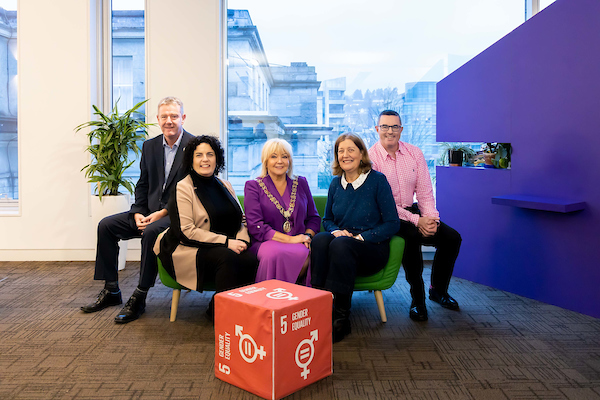
Award-winning screen and stage writer, author and director, Stefanie Preissner MC'd a conference ‘Pathways to Participation’ - Attracting and Sustaining Women as Leaders in Communities, Politics and Business’ at Cork City Hall on Tuesday November 22.
Organised on behalf of Cork City Council’s Women’s Caucus and in collaboration with Women for Election, speakers addressed challenges and opportunities faced by women across communities, politics and business and how to rebalance power in these spheres so that women, of all backgrounds, have a stronger voice and greater influence.
A keynote speech was delivered by Mary Crilly, CEO of the Cork Sexual Violence Centre, feminist activist and the 2022 Freedom of Cork City recipient for “her tireless work in raising awareness of the prevalence of sexual violence, encouraging two-way dialogue with younger people, and working with government, statutory and voluntary agencies to change and influence social policy”.
The second keynote was given by Kimberly Ellis, Director of the Department on Status for Women in San Francisco. Named the most powerful unelected person in California Democratic politics by the Sacramento Bee, Kimberly Ellis is a former Executive Director of Emerge California, which trains Democratic women leaders to run for elected office and win. Ellis is frequently interviewed by leading political media outlets, including the New York Times, Washington Post, and Associated Press.
Lord Mayor of Cork, Cllr Deirdre Forde, Minister for State at the Department of Housing, Planning and Local Government, Peter Burke TD, Chair of the Women’s Caucus, Cllr Mary Rose Desmond, CEO of Women for Election, Catriona Gleeson and Dell Technologies Vice President, Bob Savage also spoke at the conference, which is supported by the Department of Housing, Local Government & Heritage.
Lord Mayor of Cork, Cllr. Deirdre Forde said: “The conference is about bringing women and men from diverse backgrounds and from political & non-political forums together to take a hard and honest look at the systemic barriers and fears that stop many women from believing in themselves and putting themselves forward".
Chair of the Women’s Caucus, Cllr Mary Rose Desmond said: “The conference was an ideal opportunity to launch the Caucus-commissioned research, “Women’s Voices in the Council Chamber” by Dr. Aodh Quinlivan, Director of the Centre for Local and Regional Governance at UCC. We were also delighted that Caitriona Gleeson, CEO of Women for Election and Louise Purcell, Assistant Principal Officer at the Department of Housing, Planning and Local Government spoke about their work to inspire and equip more women to enter and succeed in Irish politics and the ongoing need to advocate for systemic changes”.
Dr. Philip Murphy, Department of Government and Politics, UCC, Dr. Emmanuelle Schon-Quinlivan, Lecturer in European Politics and Director of the Hub in Active European Citizenship, UCC and Luke Bishop, European Youth Parliament also spoke.
https://publications.corkcity.ie/view/245759180/
"Women in politics - Be the She Change" webinar 17th November 2021
Ireland’s ambassador to the United Nations (UN), the first woman to head up the Scouts in this country and the first Traveller woman to sit in the Oireachtas werejust some of the trailblazers who spoke at a webinar aimed at encouraging more women into politics, organised by Cork City Council in conjunction with its Women’s Caucus and supported by the Department of Housing, Local Government and Heritage.
Titled “Women in politics – Be the She Change”, the keynote address was given by Geraldine Byrne Nason, the country’s Permanent Representative to the United Nations, who drew global acclaim for her passionate speech on women’s rights in Afghanistan at the time of the US exit from the country.
Joining her were Jill Pitcher Farrell, the first female Chief Scout, Senator Eileen Flynn, the first Traveller woman to serve in the Oireachtas and Cllr Uruemu Adejinmi, the first African woman to be elected Cathaoirleach of an Irish local authority.
A panel discussion with the Caucus’s Chair, Cllr. Mary Rose Desmond, Cork City Council Chief Executive, Ann Doherty and former Lord Mayor of Cork, Catherine Clancy was moderated by Dr. Theresa Reidy (Department of Government & Politics UCC).
Cllr. John Sheehan discussed the everyday impact of period poverty with a student from St. Angela’s College, Cork City who has taken part in the Young Social Innovators - YSI Ireland project. Meanwhile, his Cork City Council colleague, Cllr. Garrett Kelleher took part in the second panel discussion moderated by Senator Flynn. Caroline O’Driscoll, partner at Deloitte Ireland and co-founder of iWish, the enormously successfully programme aimed at encouraging young girls into STEM careers, concluded the webinar.
The webinar was interpreted by two Irish Sign Language interpreters.
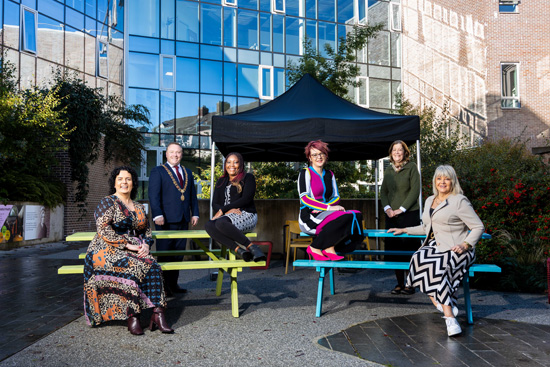
Pictured launching the webinar at Nano Nagle Place were (l to r) Cllr. Mary Rose Desmond, Chair of Cork City Council's Women's Caucus; Lord Mayor of Cork Cllr. Colm Kelleher; Dr. Naomi Masheti, Programme Director, Cork Migrant Centre; Caroline O'Driscoll, Partner, Deloitte Ireland; Cllr. Colette Finn; Cllr. Deirdre Forde.
Speaking before the webinar took place, Chair, Cllr. Mary Rose Desmond said: “We are making a real effort to encourage as many people as possible, women and men, as we can to join this webinar as the challenge of increasing the number of women in local politics isn’t going away. Put simply, women make up half of the population yet there aren’t anywhere enough of us at the tables where decisions are being made about our lives. The webinar will be enormously interesting as women from diverse backgrounds and from political & non-political forums will take a hard and honest look at the systemic barriers and fears that stop many women from seeing themselves get involved in local politics”.
https://publications.corkcity.ie/view/674974988/
History of Cork City Council's Women's Caucus
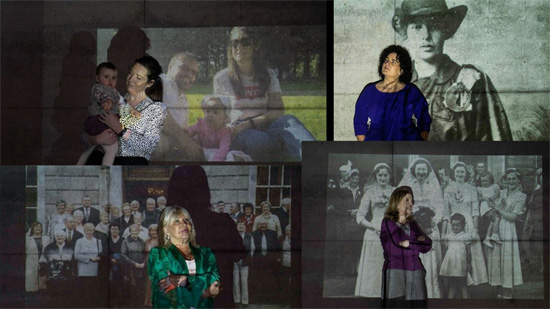
On International Women’s Day last year, Cork City Council made history by launching its first cross-party women’s caucus.
It was established “to promote women in politics and enhance female participation in Local Government by exploring barriers and challenges to participation, in addition to appropriate interventions to form collective and targeted actions on issues, in areas of common interest.”
Women remain woefully underrepresented in Irish politics and there is a clear lack of wider diversity, despite some recent gains in local government. This may signal systemic obstacles that work to undermine women’s interest in political engagement or entering politics.
Nationally, 226 women took seats in the local elections in 2019, making up 24% of all Councillors across the country. In Cork City, 24 women, out of a total of 82 candidates, ran in these elections. Six were successful, meaning just 19% of the current elected members on Cork City Council are women.
Furthermore, Cork City has a growing diverse population. Over the five-year period since 2011, only eight counties in Ireland recorded an increase in their non-Irish national population. Cork City saw the largest increase with non-Irish nationals making up 14.1% of those living in the city. Cork saw a rise of 17.2 per cent in new communities between 2011 and 2016. The Cork City Profile 2018 also reveals that over 42% of the population living in Cork city centre are non-Irish nationals.
Some 53 candidates from outside Ireland put their names forward in the 2019 Local Elections with 8 elected. In Cork City there were 3 candidates who were non Irish nationals; one of whom was Dr.Lekha Menon Margassery, an academic from the Indian state of Kerala who ran as an Independent following her attendance at the Department of Justice and Equality seminar “Engaging Migrants in Politics” and engaging with the ‘Shape Your City initiative’.
A suite of photomontage-style videos were created by videographer and photographer, Clare Keogh to explore what inspired our female city councillors to enter politics, the challenges they face as female representatives and what changes they believe must be taken to ensure local democracy is more representative, inclusive and diverse.
The videos highlight the motivations and challenges facing women politicians so please watch and share so that awareness around these issues and our new Women’s Caucus is amplified at a local, national and international level.
Cork City Council’s Corporate Plan 2019-2024 is aligned closely with the United Nation’s Sustainable Development Goals (SDGs) and gender equality lies at the very heart of these.
- 2024 Local Elections Count Results
- Ward Funds
- Meetings of the City Council
- Lord Mayor of Cork
- Meet your Councillors
- Management Team
- Regulation of Lobbying Act 2015
- Electoral Areas
- Committees of Council
- Payments to Councillors
- History of the Council
- Twinning
- Freedom of the City
- Elected representatives
- Voting
- Governance and Ethics
- Women’s Caucus
